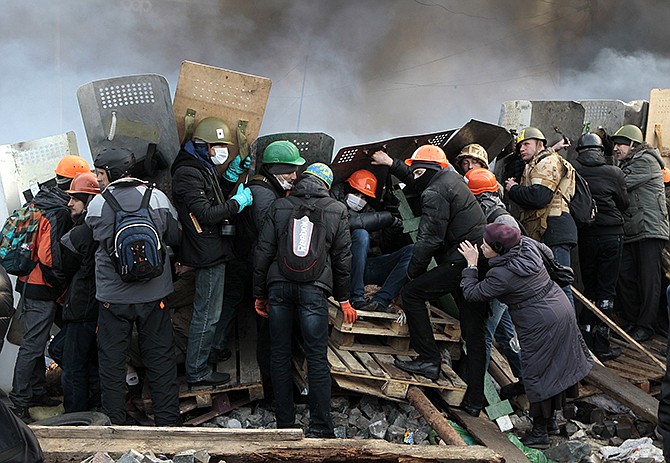KIEV, Ukraine (AP) - Ukraine's embattled president and leaders of the protests that have been roiling the country agreed Wednesday on a truce to halt the violence that has killed 26 people and injured more than 425 others. A protest leader was quoted as saying the government pledged not to attack an opposition encampment in central Kiev while further negotiations unfold.
President Viktor Yanukovych met with opposition leaders and the two sides agreed to halt the violence and to hold talks on ending bloodshed, a statement on the presidential website said. The statement did not give any further details.
Vitali Klitschko, one of the leaders of the protests that have sought to keep Ukraine open to Europe and out of a close political and economic alliance with Russia, was quoted by the Interfax news agency as saying that Yanukovych agreed that there would be no attempt to storm the protesters' encampment on the main square of downtown Kiev.
Flames from burning barricades of tires and refuse leapt into the air at the square for a second night, as protesters demanding Yanukovych's resignation showed no sign of yielding.
The truce announcement came hours after the president replaced the army chief and the military vowed a national anti-terrorist operation to restore order. Officials have often referred to the protesters who have demanded Yanukovych's resignation for months as "terrorists."
The recent violence has been the worst in nearly three months of anti-government protests that have paralyzed Kiev. The two sides are locked in a battle over the identity of this nation of 46 million, whose loyalties are divided between Russia and the West. The protests began in late November after Yanukovych turned away from a long-anticipated deal with the European Union in exchange for a $15 billion bailout from Russia.
Political and diplomatic maneuvering has continued, with both Moscow and the West eager to gain influence over this former Soviet republic. Three EU foreign ministers - from Germany, France and Poland - were heading to Kiev on Thursday to speak with both sides before an emergency EU meeting back in Brussels to consider sanctions against those responsible for the recent violence in Ukraine.
In Kiev, Ukraine's top security agency accused protesters Wednesday of seizing hundreds of firearms from its offices and announced a nationwide anti-terrorist operation to restore order.
Demonstrators, meanwhile, forced their way into the main post office on Kiev's Independence Square, also known as the Maidan, after a nearby building they had previously occupied was burned down in fierce, fiery clashes late Tuesday with riot police. Thousands of activists armed with fire bombs and rocks had defended the square, a key symbol of the protests.
"The revolution has turned into a war with the authorities," Vasyl Oleksenko, a retired geologist from central Ukraine, said Wednesday. "We must fight this bloody, criminal leadership. We must fight for our country, our Ukraine!"
Before the truce was announced the bad blood was running so high it has fueled fears the nation could be sliding toward a messy breakup. While most people in the country's western regions resent Yanukovych, he enjoys strong support in the mostly Russian-speaking eastern and southern regions, where many want strong ties with Russia.

